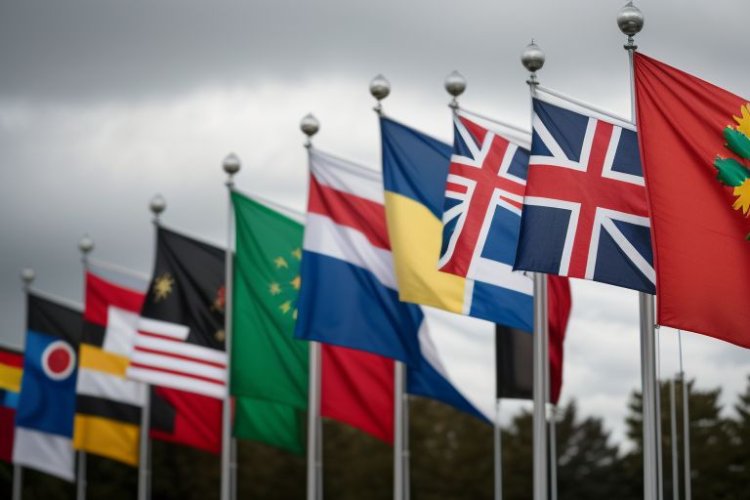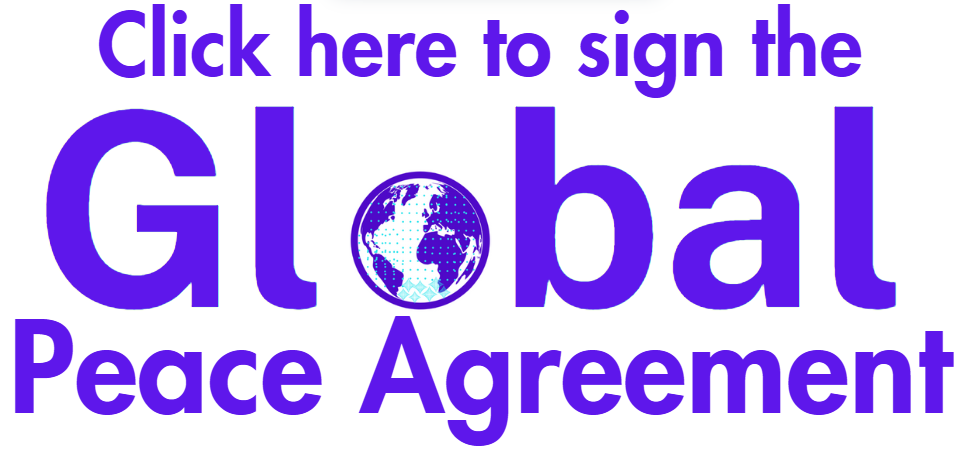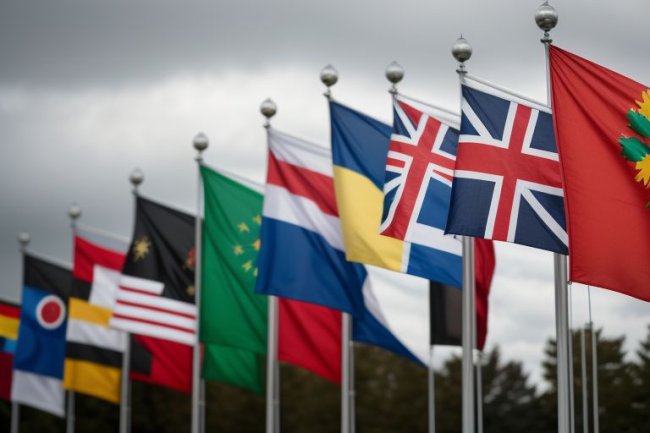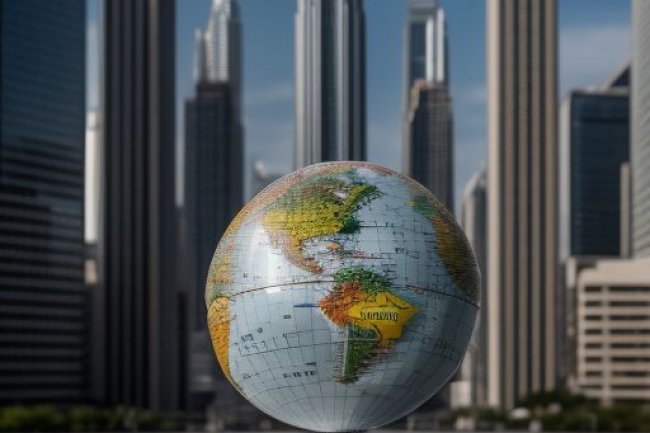SOVEREIGNTY AND COOPERATION
The interplay between sovereignty and cooperation weaves a story of complexity, unity, and the quest for a harmonious global order. Sovereignty, the cherished principle that grants nations autonomy over their internal affairs, stands as a beacon of identity and self-determination. Simultaneously, cooperation serves as a bridge that connects disparate nations, fostering shared progress and mutual understanding. The juxtaposition of these two concepts encapsulates the delicate dance between individuality and interconnectedness on the world stage.

Like a nation's cultural DNA, sovereignty is a cornerstone of modern nation-states. It signifies the right to shape domestic policies, chart independent trajectories, and safeguard unique identities. Nations have fiercely defended their sovereignty throughout history, reflecting a primal urge to govern their destinies free from external coercion. This assertion of autonomy often intertwines with pursuing equal rights and dismantling colonial legacies, spotlighting the struggle for a just global landscape.
Cooperation, however, emerges as a counterpoint to the solitary stance of sovereignty. It recognizes that the challenges of the modern era are often too colossal for any nation to confront in isolation. Climate change, pandemics, terrorism—these are but a few examples that transcend borders, demanding collective efforts. Cooperation mandates a willingness to transcend differences, join hands across oceans and ideologies, and find common ground in pursuing shared solutions. It's a testament to humanity's interconnectedness, emphasizing that the fate of one nation invariably ripples through the destinies of others.
The intricate balance between sovereignty and cooperation unveils a multifaceted narrative that necessitates nations to be both architects of their destinies and custodians of the global commons. As our world becomes increasingly intertwined through technological advancements and cultural exchanges, the understanding that sovereignty need not come at the cost of cooperation becomes pivotal. The art lies in navigating this duality, in wielding sovereignty responsibly while embracing the potential of collaborative endeavors.
In this chapter, we will explore how nations grapple with the tension between self-governance and global unity, how they reconcile their narratives with the broader symphony of international relations, and how the harmony between sovereignty and cooperation may just hold the key to a more prosperous and peaceful world. This exploration transcends theoretical discourse; it delves into the heart of diplomatic negotiations, socio-economic partnerships, and the essence of human endeavor in pursuing a better tomorrow.
The Interplay Between Sovereignty and Effective Global Cooperation
The concepts of sovereignty and effective global cooperation are threads woven together, creating a complex and captivating pattern that defines the very essence of our interconnected existence. As two dancers engaged in a graceful but intricate duet, these notions twirl and intertwine, crafting a narrative that spans politics, identity, and progress.
Sovereignty, with its roots deeply embedded in the history of nations, stands as a symbol of selfhood and independence. The sovereign power paints the distinct hues on a country's canvas, allowing it to paint its destiny, design its laws, and shape its culture. Yet, as the world continues to shrink due to technological advancements and the flow of ideas, sovereignty shares the stage with an equally compelling partner—effective global cooperation.
In the theater of contemporary challenges, from climate change's unrelenting crescendo to the crescendo of economic interdependence, the isolation of nations is but an illusion. The whisper of one nation's choices reverberates across borders, creating a symphony of consequences that knows no geographic bounds. In such a symphony, effective global cooperation takes center stage, adorned with the urgency of shared solutions and the melody of collective prosperity. The global challenges of our time transcend the neat borders drawn on maps, and in response, the hands of nations must stretch across those lines to join in a collaborative dance of survival and advancement.
The Essence of Identity and Autonomy
At the heart of each nation's existence lies the principle of sovereignty, an intricate tapestry woven through the annals of history. Much like the foundation of a magnificent building, sovereignty serves as the bedrock upon which a nation's unique identity is erected, allowing it to stand tall and resolute on the global stage. This foundational principle enshrined both in the pages of international law and in the collective psyche of nations, bestows upon each entity the sacrosanct right to chart its course without external coercion. Within these borders, cultures flourish, languages thrive, and destinies take shape, forming the vibrant mosaic of humanity's diverse tapestry.
While sovereignty affords nations their distinctiveness and autonomy, it does not exist in isolation nor render states impervious to the currents of an interconnected world. The threads of our existence have been intricately woven together by the hands of time and technological advancement. The choices made within one nation's borders ripple outward, crossing frontiers and affecting distant shores. The rise and fall of economies, the shared burden of global challenges like climate change and pandemics, and the swift currents of cross-border migration all attest to the inescapable reality of our interdependence.
The necessity of effective global cooperation resonates as a compelling refrain in this symphony of nations. The melodies of shared solutions and joint endeavors harmonize with the principles of sovereignty, acknowledging that geographical boundaries do not confine the world's challenges. From the negotiation tables of climate agreements to the collaborative efforts in vaccine distribution, the recognition that the fate of one nation is irrevocably tied to the fate of others becomes evident. Effective global cooperation, like the skilled conductor of an orchestra, orchestrates the harmonious blending of autonomy and interconnectedness, allowing the diverse voices of nations to create a symphony that transcends the limitations of individual notes.
In this narrative, the interplay between sovereignty and effective global cooperation remains both a challenge and an opportunity. It beckons nations to find equilibrium between safeguarding their identities and embracing the call for collective action. It implores leaders to recognize that the pursuit of autonomy need not come at the cost of collaboration and that in unity; the strength of individual nations can be magnified to conquer challenges that know no borders. Thus, the essence of identity and autonomy, entwined with the imperative of global cooperation, continues to shape the story of our shared human journey.
Effective Global Cooperation
The emergence of challenges that transcend geographical boundaries serves as a resounding wake-up call, compelling nations to bridge the gaps of sovereignty with the bonds of effective global cooperation. In an era where the tapestry of humanity is intricately woven, the urgency to collaborate resonates with unprecedented clarity. From the ominous specter of climate change, which knows no borders and threatens the very ecosystem that sustains us, to the swift and unrelenting spread of infectious diseases, which pay no heed to political demarcations, the imperatives of unity and shared effort become glaringly evident.
Effective global cooperation entails a symphony of nations harmonizing their disparate notes into a melody of shared solutions. It's a grand orchestra where diverse nations contribute their unique instruments—wisdom, resources, and effort—to create a composition that resonate with the symphonic power of collective action. This cooperation, exemplified through esteemed institutions like the United Nations and the World Health Organization and pivotal international agreements like the Paris Agreement, is a testament to humanity's ability to transcend self-interest and embrace the common good.
In this arena of global collaboration, negotiation, and compromise take center stage. The interplay of differing perspectives and priorities weaves a rich tapestry of diplomatic discourse, ultimately creating frameworks that address multifaceted challenges. As one nation's prosperity and security are inextricably linked to the well-being of its counterparts, the concept of shared destiny becomes a driving force. Just as the human body thrives when its various parts work in harmonious synergy, so does the global community flourish when nations unite in purposeful cooperation.
In the annals of history, this era will be remembered not only for the complexities of its challenges but also for the triumphs of collective action. The pages of tomorrow's books will recount stories of collaboration that transcended borders, illustrating how nations set aside differences and forged pathways to secure a brighter future in the spirit of solidarity. This narrative of effective global cooperation stands as a testament to humanity's capacity to rise above divisions and harness the power of unity in pursuing a shared destiny.
Synergies and Benefits
The harmonious relationship between sovereignty and effective global cooperation sets the stage for a remarkable synergy, a dynamic interplay that propels nations towards collective triumphs while safeguarding their identities. This alliance isn't a zero-sum game; rather, it's a strategic convergence where collaboration amplifies strengths and unlocks potential that transcends the boundaries of individual capabilities.
Cooperation bears fruit not only through shared accomplishments but also through the blossoming of mutual benefits. By aligning their efforts, nations can achieve outcomes far beyond the confines of their sovereignty's reach. Innovation unfurls its wings when the wellspring of knowledge, best practices, and cutting-edge technologies converge. This innovation, nurtured by the collective wisdom of diverse perspectives, becomes the cornerstone of progress that benefits all, regardless of size, status, or geographic location.
Moreover, the symphony of cooperative initiatives resounds with diplomatic overtones. The bridges built through such endeavors echo the rhythms of camaraderie and understanding. Nations that might otherwise have remained isolated find common ground on shared goals, exchanging resources and ideas, fostering cross-cultural enrichment, and nurturing cross-border relationships. This interconnectedness molds a world where geopolitical frictions can be mollified through the exchange of mutual respect and collaboration.
The European Union (EU) stands as an exemplary testament to the efficacy of this harmonious relationship. In this union of sovereign states, national identities remain steadfast while the benefits of collaborative synergy are reaped. The EU isn't a dilution of sovereignty but rather an embodiment of its strategic embodiment. Nations have pooled their strengths here to forge a formidable economic and political entity. This alliance showcases how sovereignty and cooperation, far from adversarial, can amplify one another's impact.
Within the EU, diverse nations resonate in harmony, amplifying their voices through collective endeavors in trade, security, and shared values. This cooperative ecosystem not only exemplifies the success of the synergy between sovereignty and collaboration but also illuminates the path forward for nations seeking to navigate the complex tapestry of an interconnected world.
In the grand theater of international relations, the synergy between sovereignty and effective global cooperation is a symphony in which each nation, an individual instrument, plays its part in enriching the collective composition. Through this harmonious interplay, the world moves closer to realizing the potential embedded within the realm of unity. This orchestration yields rewards that no individual sovereign state could achieve alone.
Challenges and Complexities
A realm of limitless potential exists within effective global cooperation, but it is not without its labyrinthine challenges and intricate complexities. While the allure of shared achievements beckons nations to unite, navigating the multifaceted terrain of collaboration requires a deft hand and an unwavering commitment to finding harmonious resolutions amidst divergent interests.
One of the most formidable challenges arises from the divergence in interpreting shared objectives. As nations join hands to tackle complex global issues, differing perspectives can lead to conflicts in defining the very goals they seek to achieve. Discord might emerge when nuances of priorities and aspirations are laid bare, requiring a delicate orchestration of dialogue and compromise to ensure that the collective pursuit remains focused and aligned.
The distribution of benefits is another thorny thicket to navigate. In the mosaic of collaboration, questions of who bears what burdens and reaps what rewards are inevitable. Diverse economies, resource availability, and varying levels of development can engender disparities in the benefits accrued from cooperative efforts. Negotiating this distribution fairly demands understanding each nation's unique circumstances and a commitment to rectifying inequalities for sustainable and inclusive progress.
Yet, perhaps the most intricate dance occurs around the issue of sovereignty. Nations hold their autonomy dearly, and the concept of ceding even a modicum can be met with apprehension. Striking a balance between preserving national identity and participating in cooperative endeavors requires the adept navigation of political, cultural, and economic sensitivities. Pursuing shared solutions demands a harmonious blend of principled stands and pragmatic adjustments—a symphony of diplomacy that resonates with mutual respect and understanding.
Nowhere is this intricate interplay more evident than in matters of security. The tension between safeguarding national interests and engaging in collective security arrangements exposes the heart of the complexity. While nations recognize the imperative of shared security in an interconnected world, concerns about compromising sovereignty and becoming entangled in foreign entanglements often arise. Striking the right balance here is an ardent quest for both self-preservation and the greater good—a quest that underscores the gravity of choices nations must make.
In global cooperation, the challenges and complexities serve as the chiaroscuro, casting shadows and illumination. They demand a steady hand, strategic foresight, and a willingness to traverse the intricate nuances of international relations. However, nations forge their mettle through these challenges, proving their commitment to the collective and uncovering the rich tapestry of collaborative potential beneath the surface. As the world evolves, so must the approach to these challenges, recognizing that the delicate interplay between sovereignty and cooperation is a canvas for creativity, compromise, and the continual pursuit of a more united and harmonious world.
Nurturing a Balanced Future
As our world advances through the currents of time, the delicate choreography between sovereignty and effective global cooperation remains at the forefront of shaping the destiny of nations. In this ongoing dance, striking a harmonious equilibrium demands far-sighted leadership, robust dialogue, and the agility to pivot in response to the ever-evolving landscape of challenges and opportunities. It's a process that hinges on recognizing that while sovereignty constitutes the bedrock of national identity, cooperation is the vessel through which progress can be navigated.
In this complex balance, multilateralism emerges as a beacon of guidance. Multilateral institutions and agreements provide the framework within which nations can collectively address the complexities that transcend borders while safeguarding their respective sovereignty. The United Nations Sustainable Development Goals stand as a testament to the potential of multilateralism.
Countries unite to confront universal challenges such as poverty, inequality, and environmental degradation, recognizing that a collective approach can yield transformative outcomes.
Likewise, the global response to the escalating threat of cybercrime underscores the efficacy of multilateral approaches. As digital realms transcend physical borders, the multilateral collaboration of nations becomes a strategic necessity and a means of preserving individual sovereignty in an increasingly interconnected landscape. Through shared frameworks and cooperative endeavors, nations can bolster their defenses while enhancing the security and autonomy of their digital domains.
Within the orchestration of sovereignty and cooperation, the harmonious interplay of compromise, dialogue, and adaptability gives rise to a resonating melody that reverberates within the chambers of diplomacy and global relations. Cultivating equilibrium for the future requires more than simply acknowledging the intricate tensions in motion; it mandates a steadfast dedication to the greater good, a readiness to transcend narrow viewpoints, and a profound realization that the path to advancement is most effectively navigated through collaborative efforts.
As the world scripts its narrative, the interplay between sovereignty and effective global cooperation remains an ever-evolving script, with each nation contributing its unique verse to the grand chorus of humanity's collective journey. Through the lens of multilateralism, this symphony gains depth and resonance, illuminating the path to a more equitable, secure, and interconnected future. In this future, nations, while maintaining their sovereignty, rise to the challenge of collaboration and make harmonious strides toward shared goals.
The interplay between sovereignty and effective global cooperation is a complex dance that encapsulates the essence of international relations. Nations, like individual instruments in an orchestra, each bring their unique melodies to the global stage. The harmonious symphony emerges when these melodies intersect, creating a cacophony of shared goals, collaborative efforts, and progress that resonates far beyond national borders.
The challenges are formidable, but so are the opportunities. By embracing the synergy between sovereignty and effective global cooperation, nations can navigate the turbulent waters of our interconnected world with wisdom, foresight, and a commitment to collective prosperity. In this symphony of nations, the interplay between sovereignty and cooperation becomes a testament to the power of collaboration – a force that transcends boundaries enriches identities and propels humanity toward a more harmonious future.
Navigating Challenges in Balancing National Autonomy and Global Unity
Navigating the delicate balance between national autonomy and the call for unified action on the global stage is a journey rife with complexities, an artful tightrope walk that requires the finesse of a diplomat, the foresight of a strategist, and the heart of a visionary.
Imagine the world as a grand tapestry woven with threads of diverse nations, each representing a unique identity, culture, and aspiration. These threads converge and diverge, intertwining in a magnificent display of human complexity. Sovereignty, the vibrant hue defining each thread, is a sentinel for a nation's autonomy. This sovereign power allows it to shape its destiny, weave its laws, and draw the boundaries of its narrative. This sovereignty renders each nation an independent brushstroke on the global canvas, unique yet part of a larger masterpiece.
However, the world's canvas has evolved into a vast, interconnected mural where challenges like climate change, pandemics, and cyber threats ignore borders as they traverse the terrain. In this age of instant connectivity, the juxtaposition between safeguarding autonomy and the clarion call for united efforts is undeniable. While sovereignty is the heartbeat of a nation, effective global cooperation is the symphony of heartbeats converging into a rhythm that resonates across borders, pushing nations to collaborate for solutions that transcend their scope.
One must envision a diplomatic ballet to grasp the intricacies of this interplay. The stage is set with nations representing characters, each waltzing with its identity, culture, and goals. Disagreements arise, resembling intricate footwork, as nations interpret shared objectives through their unique lens. Dialogues are the graceful spins that navigate this choreography, seeking common ground amidst the elaborate choreography of interests.
As this dance progresses, a collaborative duet emerge, where the nuanced steps of compromise and adaptability intertwine with the leaps of innovative solutions. This synergy isn't a dilution of sovereignty but a harmonious crescendo where the collective becomes more potent than the individual. The European Union is a monument to this harmony, a consortium of nations that retain their identity while leveraging collective strength for economic, political, and security endeavors.
Yet, this harmony has its dissonances. The complexities unfurl in the security spotlight, where nations grapple with the tension between safeguarding autonomy and participating in global defense alliances. The scales of equilibrium teeter a delicate act that demands wisdom in discerning when to unite for collective security while respecting the essence of sovereignty.
The paradox deepens when navigating shared objectives. In this intricate waltz, nations must harmonize their interpretations of overarching goals while finding balance in distributing the benefits of collaboration. The ripples of this collaboration extend beyond economics, forging diplomatic bridges between nations that might have otherwise remained distant.
This interplay, a captivating sonnet of tensions and unity, is adorned with multilateralism garlands. Multilateral institutions and agreements offer a stage for nations to showcase their individuality while pursuing common objectives. The United Nations Sustainable Development Goals exemplify this by stitching aspirations for global progress into a tapestry that respects the sovereignty of each participating nation.
As the curtains draw on this captivating performance, the script of balancing national autonomy and global unity remains open-ended. It is a saga of challenges and triumphs, complexities and simplicities, woven together like the myriad threads of a tapestry. It is a testament to human capacity – the ability to reconcile the seemingly irreconcilable, to harmonize the individual notes into a symphony of shared progress.
The interplay between sovereignty and global cooperation is the orchestration of a world in transformation. It's the evolution of diplomacy in an era of connectivity, a narrative that tells the tale of nations navigating through the labyrinthine corridors of autonomy and unity. It's a narrative that reinforces the realization that while national identities remain distinct, pursuing common objectives can amplify their impact.
Navigating these challenges isn't just a political or diplomatic endeavor; it's a testament to the depths of human potential. It reflects our ability to transcend borders, forge connections, and seek solutions beyond the confines of our immediate surroundings. It's a testament to the symphony of collaboration that weaves our diverse identities into the fabric of a shared future.




















